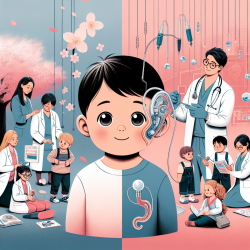Key Findings from the Study
Japan has seen significant progress in pediatric cochlear implantation, with a notable increase in the number of children receiving implants. However, the uptake rate remains lower compared to other developed countries. Some critical points from the study include:
- Approximately 55% of cochlear implant recipients in Japan are children under 18 years of age.
- Only 34% of children under three years are implanted by 18 months, aligning with the Japanese ENT Academy's guidelines.
- Neonatal hearing screening varies significantly across prefectures, impacting early diagnosis and intervention.
- There is a growing trend toward inclusive mainstream education for children with cochlear implants.
Implications for Practitioners
For speech-language pathologists and other hearing health professionals, these findings underscore the importance of early diagnosis and intervention. Here are some actionable steps to consider:
- Advocate for Uniform Screening: Push for standardized neonatal hearing screening across all prefectures to ensure early identification of hearing loss.
- Promote Early Intervention: Encourage parents to pursue early cochlear implantation, ideally before 18 months, to leverage the critical language learning period.
- Foster Inclusive Education: Collaborate with educators to support the integration of children with cochlear implants into mainstream schools, ensuring they receive the necessary resources.
- Parental Involvement: Engage parents in the decision-making process and provide them with comprehensive information about educational and therapeutic options.
Encouraging Further Research
The study highlights areas where further research is needed, particularly in optimizing early intervention strategies and improving the infrastructure for supporting children with cochlear implants. Practitioners should consider contributing to or initiating research projects that address these gaps.
Conclusion
The research on pediatric cochlear implantation in Japan offers valuable lessons that can be applied globally. By advocating for early diagnosis, promoting early intervention, and fostering inclusive education, practitioners can significantly improve outcomes for children with hearing loss.
To read the original research paper, please follow this link: New expectations: Pediatric cochlear implantation in Japan.










